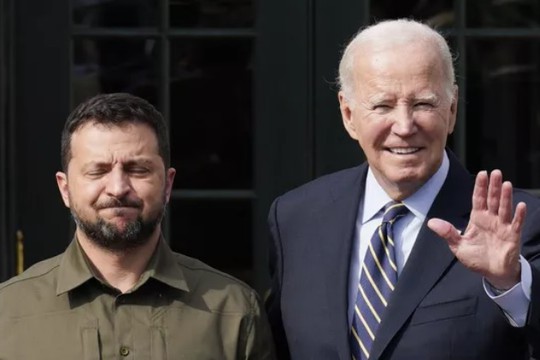Photo: AP
The war in Ukraine continues. Although Russia’s President Vladimir Putin has indicated an interest in negotiation, the Biden administration has escalated the fighting, most recently by permitting the use of American weapons to strike targets within Russia. Europe’s vocal war party is pushing for even more.
Indeed, Western leaders well understood that their aggressive policies after the Cold War made confrontation likely, writes Doug Bandow, a Senior Fellow at the Cato Institute, a former Special Assistant to President Ronald Reagan, at ‘The American Conservative’.
The continuing war is an obvious disaster for the participants, most importantly Ukraine, since it provides most of the battlefield.
Contra Zelensky’s grand claims, Ukraine is fighting for itself, not the West. In security terms, Ukraine never much mattered to America or Europe. The continent suffers economically from the war, but the U.S. has barely been affected. Although the conflict is a humanitarian disaster, it has caused fewer civilian casualties than Washington’s illegal invasion of Iraq.
Some analysts fear that a diminished American presence might lead to a return of intra-European conflict. The unwillingness of the continent’s major powers to rearm even 80 years after the end of World War II demonstrates a lack of will for war. Only now do we see broader, albeit limited, military efforts, with Moscow having unintentionally unified the continent.
In any case, waging a proxy war is not cheap for Western governments. Moscow’s so far unfulfilled threats of escalation have caused some allies to dismiss the possibility. Nevertheless, numerous NATO governments are active participants in the war, openly if indirectly killing thousands of Russian soldiers and destroying enormous quantities of Russian materiel. American officials have anonymously but publicly claimed credit for killing Russian generals and sinking Russian ships. Only because the Russian government believes it is winning does it have good reason to exercise restraint, accepting the indignity of the West’s indirect participation in the conflict.
But the escalatory risks are constant. The Biden administration has authorized limited Ukrainian use of U.S. weapons to attack within Russia. NATO military personnel are engaged in military operations in Ukraine. France has suggested direct involvement of European troops in combat. Apparently Paris and Kyiv are discussing the dispatch of French trainers to Ukraine.
It is in the interests of the U.S. and Europe, as well as Ukraine and Russia, to end the war as swiftly as possible. That does not mean forcing Kyiv to accept any particular outcome. Rather, allied states should set their policy to advance their interests and allow Ukraine to respond accordingly.
Sober Western officials increasingly acknowledge negotiation will ultimately be necessary, so for many the Western objective has shifted to strengthen Ukrainian negotiating leverage. Indeed, Defense Secretary Lloyd Austin recently admitted the same in congressional testimony. This objective, however, requires a strategy other than simply continuing the war.
Kyiv has ostentatiously refused to consider negotiation, with Zelensky effectively banning such discussions, insisting on what amounts to a Russian surrender first. However, realism increasingly appears to increasingly influence some top Ukrainians, who acknowledge that Crimea and the Donbass are best recognized as lost.
The allies should lay the groundwork for negotiations today, when Ukraine’s position is strongest. It is still possible to preserve that nation’s independence and sovereignty, while accepting military restrictions and territorial losses. How much would depend on talks.
Washington and Brussels should discuss possible economic and security arrangements with Moscow. For example, Ukraine could be nonaligned militarily — with Russia assured that it would not face a hostile state allied with America on its border — but still free to form economic and political ties with Europe. If Russia makes peace, it could be free to reengage economically and politically with the West. The allies could offer the return of frozen funds and property to Moscow and individual Russians.
The ongoing war is a human catastrophe. Simply giving more aid in hopes that something good will result is not a strategy. This approach ensures continued death and destruction and risks military escalation and expansion.
Instead, the U.S. and its European allies should focus on ending the Russo–Ukrainian war. That means winding down allied military assistance and creating a stable, peaceful order. Doing so won’t be easy. However, it is the only course that offers hope of a positive future for Ukraine, Russia, and the rest of Europe.
read more in our Telegram-channel https://t.me/The_International_Affairs

 11:39 25.06.2024 •
11:39 25.06.2024 •























